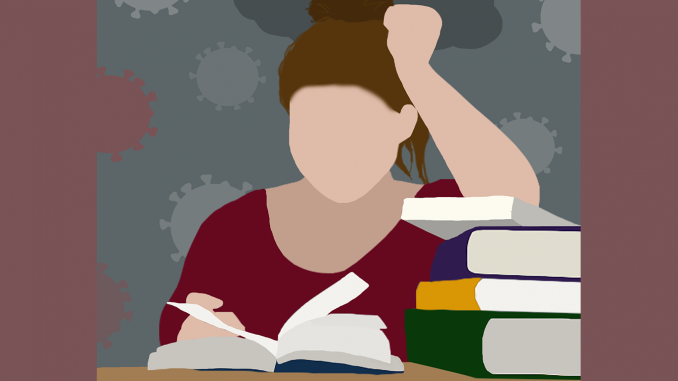
Valerie Levy was not looking forward to another semester online.
After abruptly having to end her semester abroad last spring, Levy, a junior English major, had to do “mental gymnastics” to adjust to online learning. The transition was made even more difficult by her ADHD, causing Levy to struggle to keep up with deadlines and Zoom classes, she said.
“My ADHD makes it harder for me to navigate this semester than neurotypical students, so I really hope that when I send my [Disability Resources and Services] letters to my instructors that they take my accommodations seriously,” Levy said.
Invisible disabilities, like ADHD, mental health disorders and chronic pain disorders, are not always physically visible to others but can impact how a student learns and communicates, according to the Invisible Disabilities Association. But a key barrier that prevents these students from succeeding is faculty who are uninformed, unresponsive, or don’t believe a student’s condition is legitimate, according to the National Center for College Students with Disabilities.
Tiffany Coles, a 2020 communication studies alumna, said she frequently had professors doubt her need for disability accommodations. Coles has complex regional pain syndrome, a chronic pain condition that can cause constant physical pain, according to the National Institute of Neurological Disorders and Stroke.
For Coles, this not only meant physical pain but cognitive issues, like forgetfulness and a lack of focus.
“When I would tell professors that I was in a flair, meaning for me my limbs were on fire, they were like, ‘How are you just saying that so calmly, like what do you mean, are you sure that’s it?’” Coles said.
Coles felt she spent a lot of time fighting for herself and her accommodations while at Temple, especially when classes moved online in Spring 2020.
“I felt like once stuff transitioned to online, professors would say, ‘You have all the time in the world why can’t get your stuff done? Why is it a problem, you’re sitting at home all day!’” Coles said. “But they don’t know what at home looks like for everyone, or what that does to people or what I feel like personally.”
Coles was grateful to have support from her DRS advisor, who helped her when professors gave her a hard time.
Andrea Vassar, director of DRS, said she hopes students know they can rely on advisors from the office for support.
“It’s important that they let us know what those barriers they’re having because if we don’t know what’s happening, we can’t help,” Vassar said. “We don’t want someone with a disability who’s sitting there quietly not able to access what they need.”
Emily Trott, a 2020 human development and community engagement alumna, served as the peer student leader coordinator for SHOUT, DRS’ peer mentoring program. She helped transition the group to online meetings and a group chat last semester. This helped group members continue to meet to support each other and gain self-advocacy skills.
“With having a disability, you have to have advocacy skills and know what you need to succeed in your learning and what kind of support you need to learn at your best,” Trott said.
This is an essential skill for students with disabilities, both invisible and visible when learning in an online environment, Trott said.
“Something like switching to an online setting creates another new barrier because you’re having to learn how you learned again, so what worked in your in-person class or lecture, your accommodations…may not completely support you the same way in your online courses,” Trott added. “Learning how to figure out what kind of support you need and to communicate that to your coordinators can be very difficult.”
Jonathan Atiencia, disability resources and service representative for Temple Student Government, hopes to help students with disabilities advocate for themselves by working with established student organizations like SHOUT to create Disability Rights, Education, Activism and Mentoring, or DREAM.
“I want to have the DREAM as a student organization at Temple University that DRS Temple students can rely and trust in us that we can be an advocate and activist for Temple students with intellectual and physical disabilities for their voices to be heard and their story to be told,” Atiencia said.
For students who need to advocate for themselves now, Emily Madara, a junior entrepreneurship and innovation management and marketing double major, feels that communication is key.
“It’s important to stay in touch with friends and family and loved ones, and please reach out to DRS if you do need any help during this transition, be communicative with your teachers,” Madara said. “I think that’s really important if you are struggling, especially for those of us in the ADHD and [learning disability] community.”


Be the first to comment